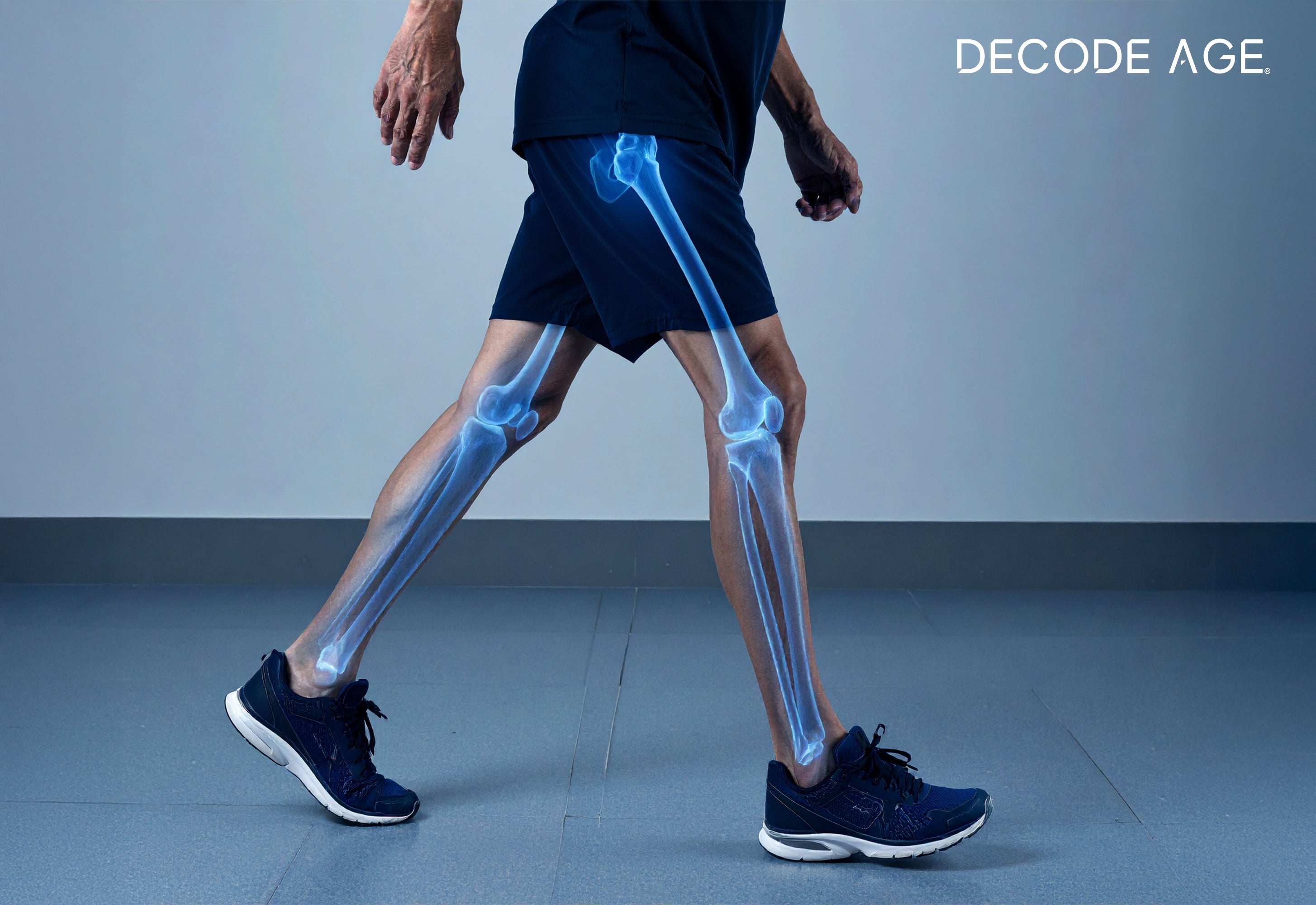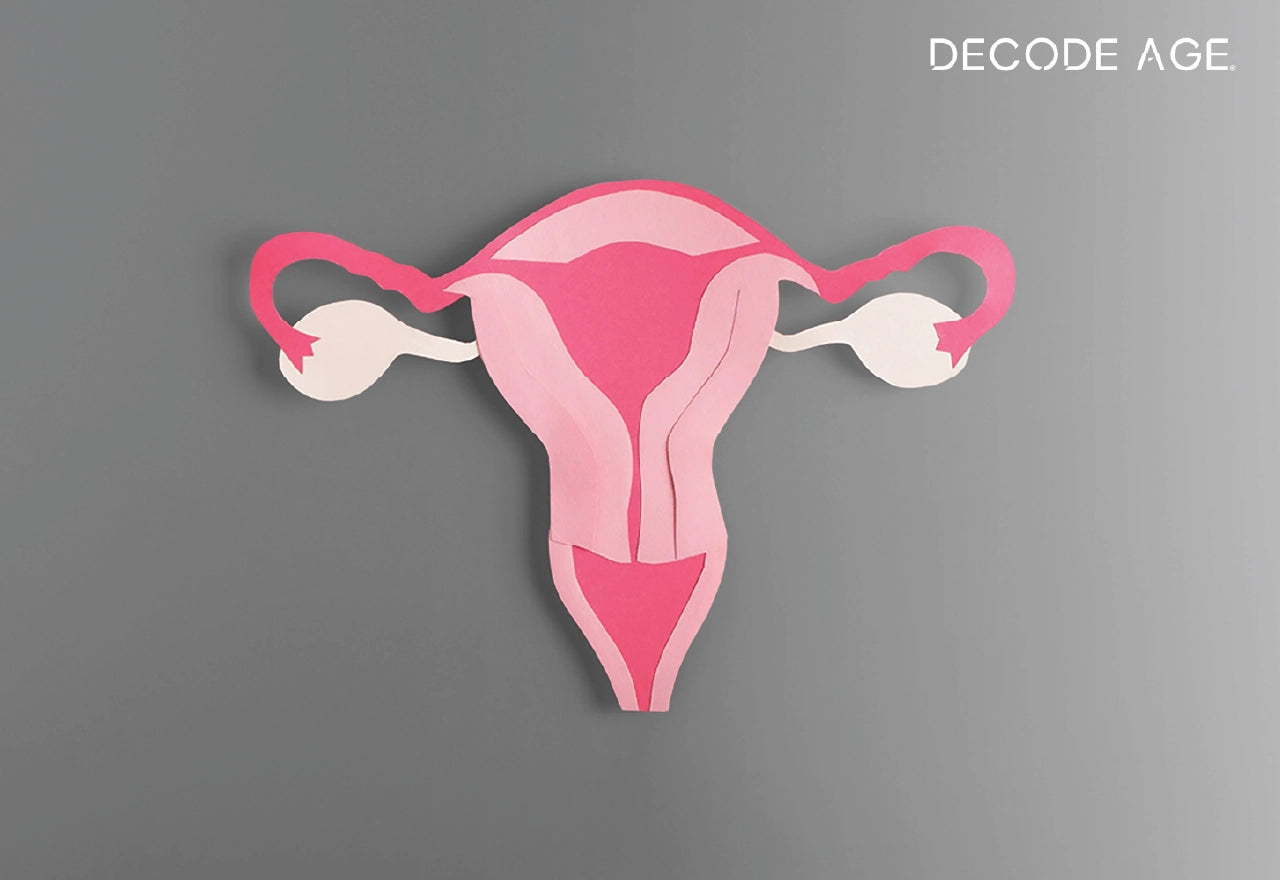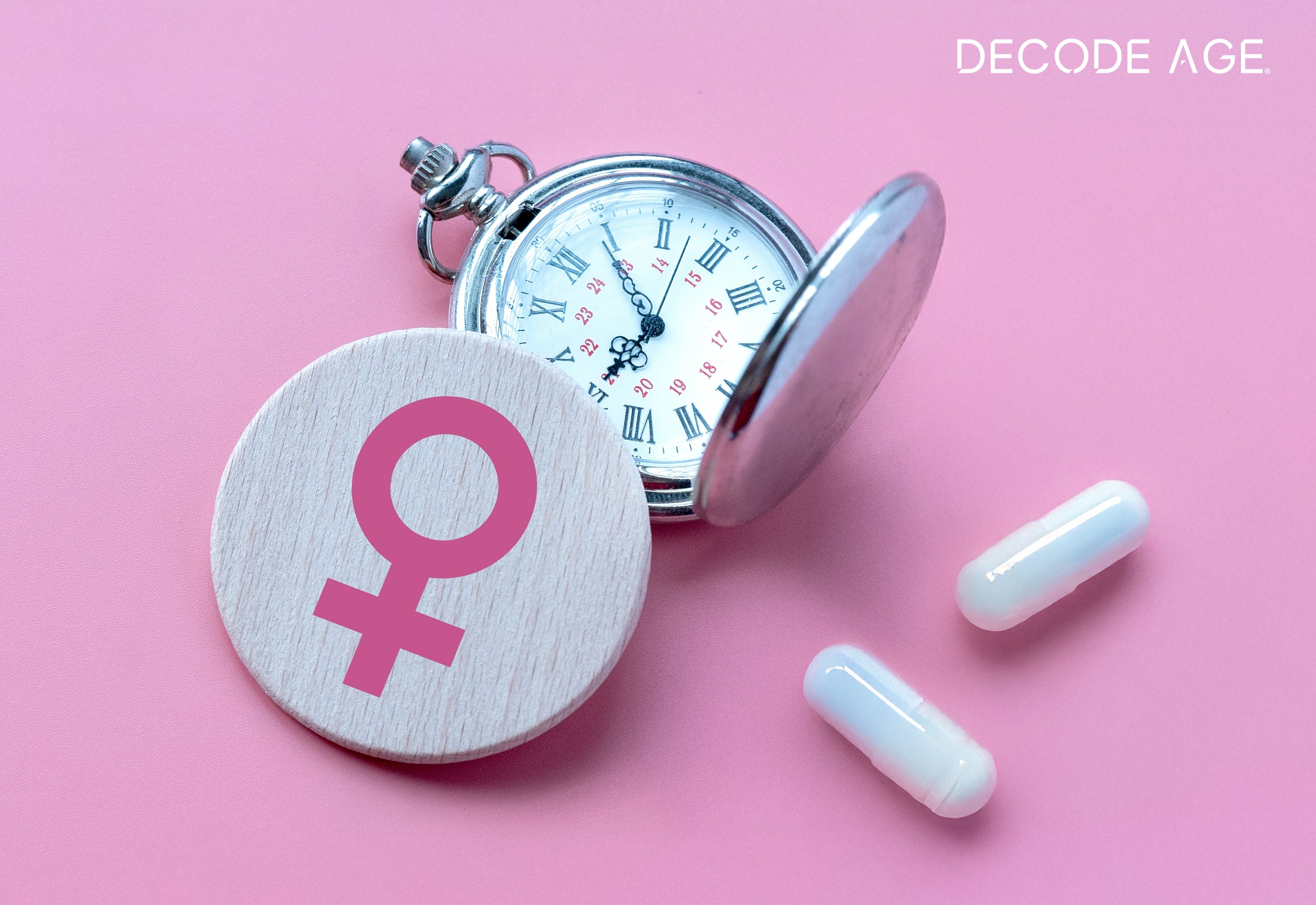Did you know menopause can significantly impact your gut health? Hormonal changes during menopause alter the gut microbiome, leading to issues like inflammation, reduced bacterial diversity, and weakened gut barriers. But there’s good news - dietary changes, probiotics, and prebiotics can help manage these effects and improve overall well-being.
Key Takeaways:
- Hormonal Shifts: Menopause reduces estrogen, causing gut bacteria changes that affect digestion, immunity, and inflammation.
- Microbiome Changes: Postmenopausal women often experience lower bacterial diversity and increased inflammation markers.
- Probiotics and Prebiotics: Specific strains like Lactobacillus rhamnosus GG and prebiotic-rich foods like garlic and flaxseeds may ease symptoms like mood swings and bone loss.
- Diet and Lifestyle: A fiber-rich diet, fermented foods, exercise, and stress management can support gut health.
Quick Overview:
| Action | Benefit |
|---|---|
| Probiotics (L. rhamnosus) | Reduces hot flashes, supports bones |
| Prebiotics (e.g., garlic) | Feeds good bacteria, boosts immunity |
| Fiber (30g/day) | Improves digestion, lowers inflammation |
| Exercise & Sleep | Enhances gut motility and balance |
Your gut health matters during menopause. Simple steps like incorporating probiotics, eating more fiber, and managing stress can make a big difference. Ready to learn more? Let’s dive in!
Menopause Changes in Gut Microbiome
Menopause brings noticeable changes to the gut microbiome, which can have a direct impact on overall health. Research highlights shifts in bacterial populations and their functions, driven by hormonal changes.
Hormonal Shifts and Gut Bacteria
Studies show that menopause is linked to changes in gut bacteria, which influence inflammation and metabolism. For example, a large study focused on U.S. Hispanics/Latinos, including 1,027 postmenopausal and 295 premenopausal women, identified clear differences in bacterial populations [1]. Here are some key findings:
| Bacterial Changes Post-Menopause | Health Impact |
|---|---|
| Increased Bacteroides sp. Ga6A1 | Tied to inflammation |
| Higher Prevotella marshii levels | Linked to metabolic shifts |
| Elevated Sutterella wadsworthensis | Related to immune reactions |
| Decreased Akkermansia muciniphila | Weakens gut barrier protection |
| Lower Escherichia coli levels | Affects nutrient processing |
These changes can influence digestion and the immune system, making the gut more vulnerable during menopause.
Effects on Digestion and Immunity
Lower hormone levels during menopause weaken the gut barrier and trigger inflammation [1]. Research has found:
- An increase in bacteria linked to inflammation and obesity in postmenopausal women.
- A reduction in bacterial diversity, with the microbiome shifting toward a pattern more typical in men.
- Changes in bacterial populations that reduce short-chain fatty acid production, which is crucial for digestion.
A Spanish study comparing premenopausal and postmenopausal women revealed notable differences in bacterial groups. Postmenopausal women had higher levels of Firmicutes and Roseburia but lower levels of Prevotella and Parabacteroides. These shifts can disrupt nutrient absorption and immune system balance.
The gut microbiome also plays a key role in hormone regulation during menopause. Certain bacteria help balance hormones through metabolic pathways, highlighting the important connection between gut health and hormonal changes.
Probiotics for Menopause Symptoms
Recent studies suggest that certain probiotic strains can support gut health and hormonal balance, potentially easing menopause symptoms. This highlights the connection between hormonal changes and shifts in the gut microbiome.
Best Probiotic Types for Menopause
Some probiotic strains have shown promise in addressing menopause-related issues. Here are a few key examples:
| Probiotic Strain | Benefits |
|---|---|
| Lactobacillus rhamnosus GG | May reduce hot flashes, improve bone density, and lower inflammation |
| Bifidobacterium animalis lactis | Can enhance sleep quality, reduce anxiety, and support bone health |
| Lactobacillus reuteri 1E1 | Helps lower the risk of urinary tract infections, improve sleep, and reduce osteoporosis risk |
How Probiotics Work
Probiotics help by reducing chronic inflammation, producing short-chain fatty acids, strengthening the intestinal barrier through increased mucus production, and supporting mineral absorption essential for bone health. They also transform plant-based compounds into beneficial metabolites.
"The standard tool to achieve this goal is the administration of probiotics. According to the World Health Organization, probiotics are live microorganisms that when administered in adequate amounts will confer a health benefit on the host." [2]
Scientific Studies on Probiotic Benefits
-
Bone Health Study
A year-long study with 90 women aged 75–80 found that Lactobacillus reuteri significantly slowed bone density loss compared to a placebo [3]. -
Improved Nutrient Absorption
A six-month trial involving 78 postmenopausal women showed that probiotic-enriched yogurt containing Lactobacillus plantarum 3547 boosted bone mineral density. -
Relief from Vasomotor Symptoms
In 2017, a study of 62 women found that combining probiotics with red clover supplementation helped reduce hot flashes and night sweats [4].
To get started, experts suggest beginning with a low dose of probiotics and increasing gradually to allow your body to adjust. This can be achieved through supplements or fermented foods like yogurt, kefir, and kimchi. These steps can also pave the way for incorporating prebiotics to further manage menopausal symptoms.
sbb-itb-55c436e
Prebiotics During Menopause
Understanding Prebiotics
Prebiotics play a key role in supporting gut health, especially during menopause. These dietary fibers act as fuel for beneficial gut bacteria, which can be affected by hormonal changes during this stage of life. Maintaining a healthy gut with prebiotics can help manage menopause-related challenges like mood swings, weight gain, and bone health issues.
Here are some examples of prebiotic-rich foods and how they contribute to gut health:
| Prebiotic Food Source | Benefit |
|---|---|
| Chicory root | Contains inulin, which feeds beneficial gut bacteria |
| Jerusalem artichoke | High in inulin to promote a healthy digestive system |
| Flaxseeds | Provides fibers that support overall gut health |
| Dandelion greens | Rich in dietary fiber to encourage the growth of healthy bacteria |
| Garlic and onions | Contain natural prebiotics that boost gut and immune functions |
Including these foods in your diet can help maintain gut balance and may also ease menopause-related symptoms like mood changes, weight fluctuations, and bone density concerns.
Prebiotic and Probiotic Combinations
When prebiotics and probiotics work together, they create a powerful synergy known as synbiotics. This combination enhances the survival and effectiveness of probiotics, making them even more beneficial for gut health. Research highlights that prebiotic fiber supplementation can significantly increase the population of friendly gut microbes.
To maximize the benefits during menopause, aim to include a variety of prebiotic-rich foods in your meals, both raw and cooked. Some excellent options include:
- Whole grains and legumes
- Vegetables like asparagus and artichokes
- Fruits such as bananas and apples
- Seaweed and avocados
Another important factor during menopause is the estrobolome, a group of gut bacteria that helps regulate estrogen levels. Since estrogen levels naturally decline during menopause, supporting these bacteria with adequate prebiotic intake becomes even more crucial.
New Research and Individual Treatment Options
Latest Microbiome Studies
Recent studies have revealed a connection between menopause and gut health. Research published in BMC Women's Health in November 2024 studied 44 perimenopausal women, grouping them based on FSH levels. The findings showed that gut microbiota composition changes alongside hormone levels [5].
The ZOE study identified 32 specific bacterial species linked to both Menoscale scores and diet quality [6]. This suggests that adjusting diet could influence gut health and help manage menopausal symptoms.
| Microbiome Changes | Pre-Menopause | Post-Menopause |
|---|---|---|
| Bacterial Diversity | Higher | Lower |
| Inflammation Markers | Lower levels | Increased levels |
| Overall Composition | Female-typical | More male-like |
These insights point toward the potential for personalized gut health strategies during menopause.
Advantages of Comprehensive Gut Testing
Comprehensive gut microbiome testing provides a deeper understanding of how menopause impacts gut health. Modern testing techniques assess factors like microbial diversity, inflammation markers, hormone-metabolizing bacteria, and nutrient absorption. Studies show that postmenopausal women often have distinct gut bacteria profiles, with higher levels of bacteria tied to inflammation and obesity [6].
"This shows that we can potentially modify some of the unfavorable effects of menopause by ensuring a healthy microbiome, and we can change this by having a healthier diet filled with more plants and less processed foods." - Dr. Sarah Berry, Lead Nutritional Scientist at Zoe
These tests allow for personalized recommendations that can better address menopausal symptoms.
Decode Age: Tailored Ageing Solutions
Using these findings, personalized treatment options are becoming more accessible. Decode Age offers advanced microbiome testing and customized plans to support women through menopause.
The company's approach includes:
-
Metagenomic Testing
This method evaluates over 30 gut health markers, identifying bacterial imbalances that may impact menopausal symptoms. -
Personalized Treatment Plans
Based on test results, plans include dietary changes, supplements, and lifestyle adjustments. -
Ongoing Monitoring
Regular follow-ups track progress and refine treatments as needed.
Given that microbial cells exist in roughly a 1:1 ratio with human cells [1], maintaining gut health is crucial during menopause.
Conclusion: Main Points About Menopause and Gut Health
Menopause brings significant changes to gut health, impacting digestion, immunity, and overall well-being. Hormonal shifts alter the gut microbiome, reducing bacterial diversity and increasing inflammation. However, dietary and lifestyle adjustments can help support gut health and alleviate menopause-related symptoms.
Probiotics like Lactobacillus rhamnosus GG and Bifidobacterium animalis lactis can help ease symptoms such as hot flashes and bone loss. Prebiotic-rich foods, including garlic, flaxseeds, and chicory root, nourish beneficial gut bacteria. A balanced diet, regular exercise, and stress management play a crucial role in maintaining gut health during menopause. Additionally, personalized strategies such as microbiome testing can help women optimize their gut health and overall well-being.
Taking proactive steps—such as increasing fiber intake, incorporating probiotic-rich foods, and reducing stress—can significantly improve gut health and support healthy aging during menopause.
FAQs
How does menopause impact gut health?
Menopause alters the gut microbiome by reducing bacterial diversity, increasing inflammation, and weakening the gut barrier, which can affect digestion, immunity, and metabolism.
Can probiotics help with menopause symptoms?
Yes, certain probiotic strains (Lactobacillus rhamnosus GG, Bifidobacterium animalis lactis) have been shown to support hormone balance, improve bone health, and reduce inflammation.
What are the best foods for gut health during menopause?
A fiber-rich diet with plenty of prebiotic foods (garlic, onions, flaxseeds), fermented foods (yogurt, kefir, kimchi), and polyphenol-rich foods (berries, green tea) can help maintain a healthy gut microbiome.
What is the estrobolome, and why is it important?
The estrobolome is a group of gut bacteria that regulate estrogen metabolism. Since estrogen levels decline during menopause, supporting these bacteria through diet and probiotics is crucial for hormonal balance.





























Leave a comment
All comments are moderated before being published.
This site is protected by hCaptcha and the hCaptcha Privacy Policy and Terms of Service apply.